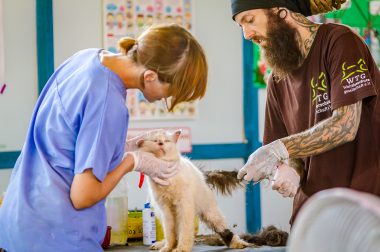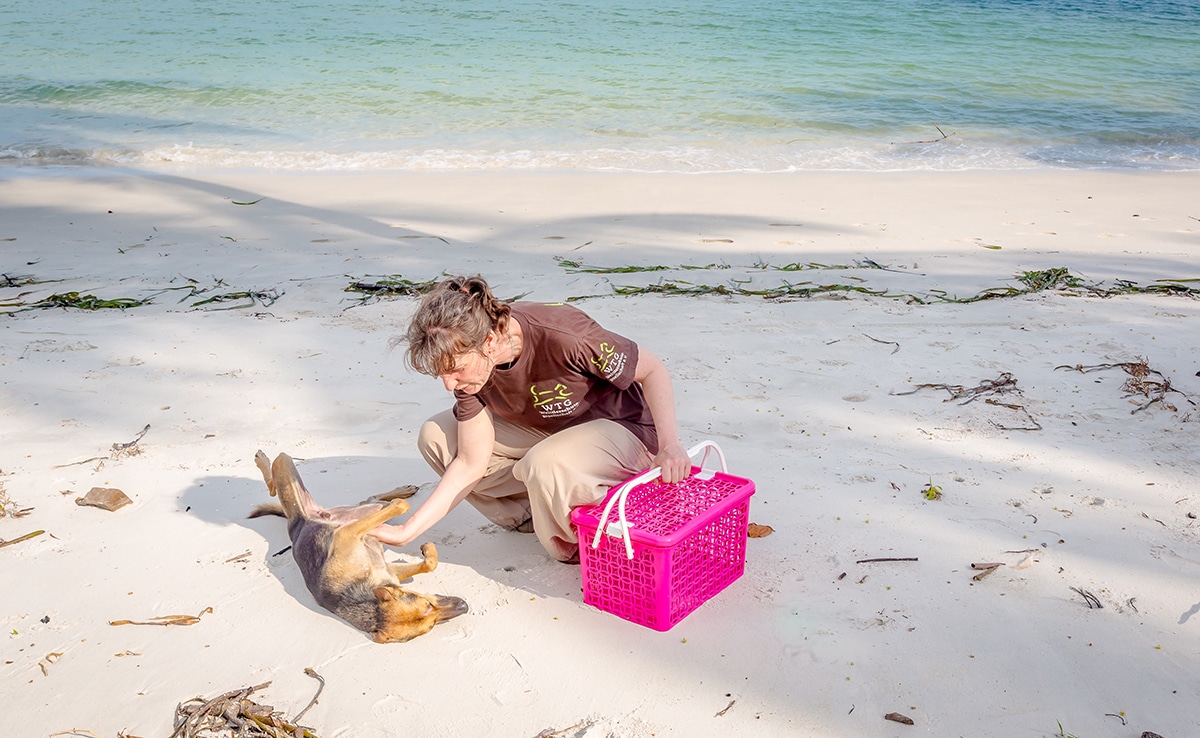About 40 million foreign tourists have recently traveled to Thailand every year, including more than 800,000 Germans. Particularly popular with European guests is the free time around Christmas and the turn of the year, when many escape the uncomfortable winter weather at home. But due to the Corona pandemic, everything is different this year: Tourism has come to a standstill, the holiday regions, for example in the south of the country, have to do without millions of guests from abroad. This has far-reaching implications: directly for the local economy and the people working in the tourism industry, but subsequently also for the countless stray animals that have their home in holiday resorts such as Phuket or Ao Nang as well as on the island archipelagos and are also dependent on tourism.
Dogs and cats suffer from hunger
Animal rights activists like Helen Guy are very concerned about this development. Guy came to Koh Lanta as a tourist in 2014 and started working as a veterinarian for the animal welfare organization Lanta Animal Welfare the following year. As part of a project with the World Animal Welfare Society (WTG) from Berlin , she is working not only on Koh Lanta, but also on other islands in the region as well as in the coastal towns on the mainland to treat, vaccinate and neuter stray animals.
Guy is therefore well aware of the consequences of the tourism crisis for dogs and cats in the holiday resorts: “Many strays live off the leftovers on the streets and in front of the hotel restaurants. With many hotels, resorts and restaurants now closed, the animals are likely to become increasingly hungry in the coming months, and some may even starve.”
Income for animal welfare work fails to materialize

According to Guy, the consequences for local animal welfare work are already being felt: “In addition to our own donations and the support of the World Animal Welfare Society, we also finance our work through donations from visitors to the inpatient clinic and the animal shelter.” This income would currently be missing without international tourists. In addition, many international volunteers who normally help out in the clinic stayed away. All this currently makes it difficult to carry out animal welfare work on site to the usual extent.
“The government is now increasingly promoting national tourism and in fact, more Thai tourists are coming to the islands again at the moment – but nowhere near the number that is usual for the time of year,” says Helen Guy. “On the islands like Koh Lanta, many people depend on tourism in the high season and will probably perish economically if it fails to materialize.”
Abandoned animals
The lack of main tourism thus exacerbates the plight of many Thais employed in tourism, who abandon their animals more often or leave them on the islands. This can also result in uncontrolled reproduction if these animals are not neutered. That is why, from Helen Guy’s point of view, it is so important that animal welfare work on site can continue uninterruptedly and that dogs and cats are neutered as part of the mobile missions and that the population is sensitized to animal welfare problems.
Animal welfare activists also know from many examples: With the plight of people, animal suffering also increases because people’s frustrations lead to violence against animals. Helen Guy is therefore afraid that attacks on animals will continue to increase. Just recently, on the way back from a mobile clinic in Sikao, she and her team picked up a dog on the side of the road that had an extremely large head wound. His injury was most likely a burn caused by hot oil, which was already eaten through by maggots at the time he was found. “It was a gruesome sight,” Guy recalls. “We immediately took him to the clinic, gave him veterinary care and sterilized him.” The dog, which was named Edward, was able to recover on Koh Lanta and become completely healthy again. It is cases like these that give Helen Guy the strength to carry on – even in the current difficult time for animal welfare work in Thailand.
In order to alleviate the suffering of the stray animals on Koh Lanta and the neighboring islands, the World Animal Welfare Society the work of Helen Guy and Lanta Animal Welfare. The association is dependent on donations from animal-loving people. During the Christmas season, there is the opportunity to save the lives of stray dogs with a gift donation. Further information at: https://welttierschutz.org/spende-verschenken/


